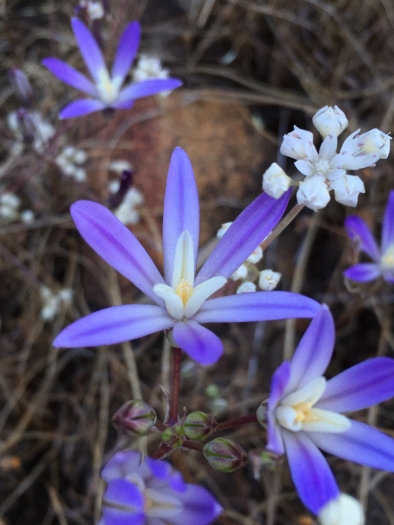Dwarf Brodiaea
(Brodiaea minor)
Dwarf Brodiaea (Brodiaea minor)
/
/

Matt Berger
CC BY 4.0
Image By:
Matt Berger
Recorded By:
Copyright:
CC BY 4.0
Copyright Notice:
Photo by: Matt Berger | License Type: CC BY 4.0 | License URL: http://creativecommons.org/licenses/by/4.0/ | Rights Holder: Matt Berger | Publisher: iNaturalist | Date Created: 2019-07-01T19:35:25-07:00 |






Estimated Native Range
Summary
Brodiaea minor, commonly known as dwarf brodiaea or vernalpool brodiaea, is a perennial herb native to the grasslands and vernal pools of the Sierra Nevada foothills in central California. It is a small plant, typically producing an erect inflorescence that reaches up to 4 inches tall, with light purple, urn-shaped flowers that have narrow, spreading tepals. The flowering season occurs in late spring to early summer, and the flowers are moderately showy, adding subtle color to the landscape. This species is adapted to the unique conditions of vernal pools, which are seasonal wetlands that dry up in the summer months.
Dwarf brodiaea is valued for its ability to thrive in the challenging conditions of vernal pools and grasslands, contributing to the biodiversity of these ecosystems. It is often used in native plant gardens, restoration projects, and as a component of wildflower meadows where its low water requirements and tolerance of poor, dry soils are advantageous. In cultivation, it prefers full sun to light shade and requires well-drained soils. While generally low-maintenance, it is important to mimic its natural habitat by providing a dry period during the summer months to simulate the drying of vernal pools. There are no significant disease or pest problems associated with Brodiaea minor, but it is crucial to avoid overwatering to prevent rot.CC BY-SA 4.0
Dwarf brodiaea is valued for its ability to thrive in the challenging conditions of vernal pools and grasslands, contributing to the biodiversity of these ecosystems. It is often used in native plant gardens, restoration projects, and as a component of wildflower meadows where its low water requirements and tolerance of poor, dry soils are advantageous. In cultivation, it prefers full sun to light shade and requires well-drained soils. While generally low-maintenance, it is important to mimic its natural habitat by providing a dry period during the summer months to simulate the drying of vernal pools. There are no significant disease or pest problems associated with Brodiaea minor, but it is crucial to avoid overwatering to prevent rot.CC BY-SA 4.0
Plant Description
- Plant Type: Herb, Bulb
- Height: 0.5-1 feet
- Width: 0.5-1 feet
- Growth Rate: Moderate
- Flower Color: Blue, Purple
- Flowering Season: Spring, Summer
- Leaf Retention: Deciduous
Growth Requirements
- Sun: Full Sun, Part Shade
- Water: Medium
- Drainage: Medium, Fast
Common Uses
Bee Garden, Butterfly Garden, Low Maintenance, Rock Garden
Natural Habitat
Native to the grasslands and vernal pools of the Sierra Nevada foothills in central California
Other Names
Common Names: Lesser Brodiaea, Dwarf Brodiaea, Small Brodiaea
Scientific Names: , Brodiaea minor, Brodiaea grandiflora var. minor, Brodiaea minor var. minor, Brodiaea purdyi, Hookera minor, Hookera minor, Hookera minor, Hookera minor, Hookera minor var. multiflora
GBIF Accepted Name: